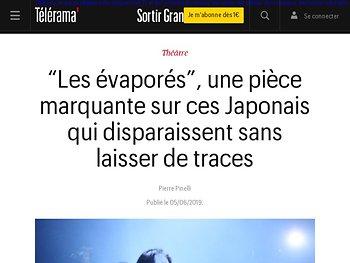“Les évaporés”, a striking piece on these Japanese who disappear without leaving a trace<
Every year, thousands of Japanese choose to disappear into the wild, without leaving an address. At the Théâtre de la Tempête, the actress Delphine Hecquet is directing a play on the phenomenon affecting the Japanese peninsula.
In April 2015, Delphine Hecquet passed away. Twelve days in Japan for a crazy project: questioning Japanese people on the phenomenon of "evaporated people". Each year on the archipelago, a frightening number of individuals – one hundred thousand according to the police – choose to disappear without leaving an address. They voluntarily vanish in the wild. Some even use the services of “evaporators”!
Enough to raise many questions, especially in a thirty-year-old native of Bordeaux, actress (trained at the National Conservatory of Dramatic Art), author and theater director, worked on the theme of identity. “Who has not imagined once to slam the door on his life? Evaporation is a violent rupture, the result of an impediment, of an apparent dead end…”
A staggering phenomenon, a bold approach: Delphine Hecquet goes there without speaking a word of Japanese. She writes questions that she has translated and submits them, facing the camera, to anyone who understands her phonetics and agrees to break the taboo. Seven people, that's a few and a lot, don't run away when they hear the impudent pronounce the word "jōhatsu" ("evaporated"). What's more, Delphine not understanding a thing, will have to wait for her return to have the answers translated! All of this could have turned into… vaporous, if it had not actually given rise to the creation of a play taken up again in June at the Théâtre de la Tempête.
Let's not talk about documentary work. Let's not imagine unraveling the mystery of these incredible defections. “I am not at all a specialist in these questions, underlines Delphine Hecquet. What challenges me in this phenomenon of evaporations are the fictions it triggers. I wrote two questionnaires, one for evaporated and the other for close to evaporated, asking these people to choose one of the two and imagine the answers. It was a question of inventing a character, which protected them from any too intimate confession. For my part, going into the unknown in this way, going so far as to experience my own feeling of evaporation, is the best way to awaken my imagination. Wandering inspires me. »
We can't teach your kid to rake leaves, but we can teach them how to rake at the plate. https://t.co/P8FHPwQao0 https://t.co/DhLCPCtK2C
— Texas Rangers Thu Oct 18 22:00:10 +0000 2018

How this dizzying “jōhatsu” can grab hold of, signifying disappearance as much as it designates the transition from liquid to gaseous state. “In the play, a young woman girl says of her father that he has evaporated and not that he has disappeared. It has metamorphosed like water changes to vapour.
So let's get to the fiction. That of a French journalist who went to investigate in this country where failure is seen as a dishonor. This is the red thread of the piece and the Western gaze. At his side on stage, and on screen, interpreted by Japanese actors, women and men, no longer there, still there. “Those who remain probably interest me more than those who have left. What stories do we invent to accept the absence of the other? What to do with the impossible mourning of an evaporated person? In the room, there is this girl who returns nine years after her evaporation. “Why are you coming back? I don't love you anymore, I've waited too long for you,” her mother told her. »
Combining drama, poetic force, dance scenes and video projections, the piece is spoken in Japanese. The surtitles in French are projected in such a way as to form an integral part of the decor. The mark of an original creative process. “When I returned from Japan, I directed the actors for a month in improvisation. After that, I was able to write the play as part of the National Center for Performing Arts in Villeneuve-lès-Avignon. The text was then translated into Japanese. The actors are re-intervened. Sometimes there were long discussions. Some things are untranslatable in Japanese or conversely, difficult to express in French. Just as it was not easy to stage actors in a language that I do not master at all! We had to find ways to go. When you can't say, you show,” smiles Delphine Hecquet, who thus delves into the question of identity. "That's the main subject of the play. On the one hand, the evaporated choose to redefine their identity. On the other hand, those who remain, the relatives, are also forced to define themselves differently, brutally. Ultimately, it is a universal question: how do we build ourselves? »
TO SEE: Les Évaporés, text and direction Delphine Hecquet. From June 5 to 23, Théâtre de la Tempête, Cartoucherie, Route du champ de libération, 12th, from Tue. to Sat. at 8.30 p.m., Sun. at 4.30 p.m., prices: €22, €16, €13 and €10


 Tags:
Tags: Prev
Prev







